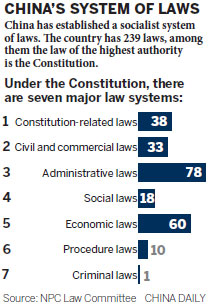Top legislator warns of chaos unless correct path is taken
Wu said the formation of such a system has generally solved the problem of having laws for people to follow, and more efforts will be made to revise and improve existing laws, enact rules of implementation, and ensure better enforcement.

Wu also made it clear that while China wants to improve its legal system, it will "never blindly follow or imitate others".
"Different countries have different systems of laws, and we do not copy the systems of laws of certain Western countries," he said.
NPC deputies spoke highly of Wu's remarks.
"China's existing political system is based on our own conditions and can thus better ensure stability," said Han Yuchen, a deputy from Handan in Hebei province.
"Such a system shows its merits particularly when the country faces emergencies and disasters, such as the 8.0-magnitude earthquake in Sichuan in 2008."
Han said the Chinese people have greatly benefited from social and economic development over the past decades thanks to the stable political system.
"Although there're some social problems existing, the leadership is making great efforts to address them. I don't think the riots that recently occurred in some other countries will happen in China," he said.
Wang Dongzhou, a deputy from Chengdu in Sichuan province, said the recent chaotic situation in Libya and Egypt once again demonstrates that internal disorder will ruin the fruits of years, or even decades, of social and economic development.
"The establishment of a socialist law system has laid the foundation for the rule of law in China and institutionally ensures the right direction for the country," he said. "We must follow it to prevent any disorder."
 0
0 






